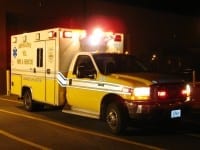Did someone say “cash flow interruptions?” The Centers for Medicare & Medicaid Services (CMS) continues the expansion of a pilot program that first required ambulance suppliers in South Carolina, New Jersey, and Pennsylvania to obtain prior authorization for repetitive, scheduled, non-emergency ambulance transports. CMS defines a repetitive ambulance service as being a non-emergent transport that is furnished three or more times during a 10-day period; or at least once per week for at least three weeks. Beneficiaries who usually require these services are often receiving dialysis, wound care, cancer treatment, or have other conditions that prohibit them from being able to use contemporary means of transportation. Due to the program’s Phase I success (as perceived by CMS), CMS has initiated Phase II by expanding the initiative into Delaware, the District of Columbia, Maryland, North Carolina, Virginia, and West Virginia as of January 1, 2016.
Phase II of the initiative is a mandated expansion from the Medicare Access and CHIP Reauthorization Act of 2015 (MACRA), which was passed by Congress last year. If Phase II continues the success achieved in Phase I, CMS has indicated it will implement the program nationwide in 2017.
We first told you about CMS’ implementation of Phase I in our April 2015 eNewsletter article, “Ambulance Suppliers and Physicians—Effects of New Medicare Prior-Authorization Requirements.” During Phase I, both ambulance suppliers and patients were affected by the prior authorization requirements. Many ambulance suppliers with whom we spoke reduced their workforce as a result of cash flow interruptions they encountered, and stated some patients had to seek alternative methods of transportation.
So what else can suppliers and physicians take away from the Phase I implementation to better prepare us for the future expansion of this initiative? The following are a few key observations.
Lessons Learned from Phase I:
— Workflow:
- Ambulance Suppliers: Historically, physicians have not provided ambulance suppliers with documentation support for medical necessity unless an appeal was required. Even though this pilot initiative did not specifically create new clinical documentation requirements, a physician’s support of medical necessity is required in every qualifying case in order to submit the prior authorization. Therefore, ambulance suppliers must incorporate new workflow strategies to ensure that they receive the appropriate documentation from the beneficiary’s primary care provider to support medical necessity and to complete the necessary forms prior to rendering qualifying services. Such solutions to consider may include marketing and education initiatives to gain physician practice cooperation.
- Physician Practices: Since physician practices were historically not required to submit medical necessity support for transport on a regular basis, they will need to incorporate a workflow solution to ensure that complete, legible, and timely documentation is supplied to the ambulance supplier.
— Cash flow:
- Ambulance Suppliers: All claims for non-emergent transports lacking the prior authorization before claim submission are now stopped by CMS for prepayment review. In Phase I, the delay in getting transport approval can be attributed to 1) needing to send multiple prior authorization requests to CMS, or 2) awaiting medical records from the patient’s physician to help support the medical necessity of the transport. Suppliers can anticipate delays due to the increased efforts required to obtain the medical record from physician practices, the prior authorization requirements from CMS, as well as delays attributed to CMS’ continued efforts to iron out the process.
As with any new initiative, project, or change, providers should anticipate workflow interruptions and cash flow delays. Suppliers impacted by Phase II should review the information provided by CMS and incorporate any new processes into their workflow as soon as possible if they wish to prevent a potential cash flow interruption. It will also be helpful to recruit the support of physician practices to ensure their timely responses to requests for information and documentation.
CMS has created a workflow solution to complete thousands of requests from non-emergency providers. To support this effort, CMS has provided valuable information on its website to address common issues encountered during Phase I.
If you have questions about the ambulance supplier pilot program or need assistance with workflow or cash flow strategies related to this initiative, contact one of the experts listed below at PYA at (800) 270-9629.


